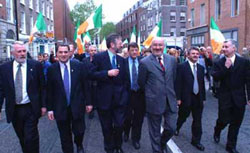 |
Irisch
Republikanische Solidarität
|
 |
Flash: Britain unveils demilitarisation programme
Britain's Direct Ruler in Ireland, Peter Hain, has outlined a
programme for demilitarisation in the North of Ireland.
A commitment to drastically reduce Britain's military garrison
in Ireland was originally made under the Good Friday Agreement
over seven years ago.
Under the "security normalisation" plans, a number of British
Army spy posts and towers will be closed and PSNI police
stations will be defortified. Details of the phased plan are
published below.
However, Mr Hain said that after two years, a British "peacetime
garrison" of five thousands troops would remain on Irish soil
indefinitely.
Mr Hain said: "The programme published today will see the
creation of an environment which will allow the return of
conventional policing across Northern Ireland."
The Irish-based battalions of the Royal Irish Regiment are to be
disbanded in 2007 as part of the military wind-down. A locally
recruited pro-British militia, these battalions were known until
1992 as the Ulster Defence Regiment.
The British Army will end its support role to the PSNI police on
1 August 2007, the same day that the battalions will disband.
The British Army's general officer commanding, Lieutenant
General Sir Reddy Watt said: "The Royal Irish Regiment (Home
Service) and their predecessors, the Ulster Defence Regiment,
have played a crucial role in creating the enabling environment
for normalisation to begin.
"Once the Police Service of Northern Ireland no longer needs
routine military support, the three Home Service battalions will
have successfully completed the task for which they were
raised."
The DUP's Jeffrey Donaldson condemned the decision.
"This decision has come as an absolute bombshell," Mr Donaldson
said. "I'm absolutely devastated by this news."
He said the government "underestimates entirely the anger that
this will create in the unionist community".
Sinn Fein's Conor Murphy called on unionists to embrace
demilitarisation.
"I have to ask who wants to live in a heavily militarised
society. It is for all our benefits, unionists as well as
nationalists and republicans, to see society here
demilitarised," he said.
-------------------------------------------------------------
The following is the full text of the statement, outlining the
demilitarisation programme.
-------------------------------------------------------------
In April 2003 the government set out proposals to normalise the
security profile across Northern Ireland when there was an
enabling environment.
Following the IRA statement of 28 July, we are now moving
quickly to begin that process.
Today I am publishing planned normalisation programme agreed
with the chief constable and the Army GOC [General Officer
Commanding Northern Ireland].
My first and over-riding priority and that of the chief
constable and the GOC is the safety and security of the people
of Northern Ireland.
We will not do anything that will compromise that.
Provided the enabling environment is established and maintained
this programme will be achievable within two years though if the
conditions are right to move more quickly in implementing
elements of the plan, the government will do so.
The programme published today will see the creation of an
environment which will allow the return of conventional policing
across Northern Ireland.
Update to Annex 1 of the Joint Declaration
This paper provides the updated version of the normalisation
programme which was promised in the government's statement of 28
July.
The steps which will be undertaken in a normalisation programme
assuming an enabling environment is created and maintained will
be as follows:
Within the first eight months, in an enabling environment, we
would have achieved:
* The vacation and closure of Forkhill Base; the removal of
Tower Romeo 12 in South Armagh; and dismantling of the super
sangar in Newtownhamilton. Work has already started and will be
completed within a six-month period
* The removal of the observation post at Divis Tower in
Belfast and the two observation towers at Masonic in
Londonderry. Work is beginning this week and will be completed
within a six-month period
* The successive removal of two towers in South Armagh G10
(Creevekeeran); G20 (Drummuckavall). Work will start within a
few weeks and be completed within a six-month period; with the
sites restored to Greenfield status as soon as possible
* The publication of a structured plan for phased reduction
in troops to peacetime levels
* The continuation of the review of the police estate with
action taken as agreed with the Policing Board following
consultation with district commanders and local communities,
including work to defortify some 24 police stations.
Within the next 12 months, in an enabling environment, we would
have achieved:
* Further defortification of police stations. Progressive
development of and extension of varying patrol patterns: eg
single beat officers, bicycle patrols and opening of police
shops
* The vacation and demolition of the remaining South Armagh
towers. These sites, with the exception of a Blue Light
communications site at Crosleive, would be returned to
Greenfield status as rapidly as possible thereafter
* Progressive withdrawal of soldiers from sites where
co-located with police in Armagh (Crossmaglen, Newtownhamilton,
Middletown) and in Fermanagh and Tyrone
* The removal of the military base within Maydown police
station
* A reduction in troop numbers in line with the published
plan
* The return of private property on vacated sites.
Within the final four months, in an enabling environment, we
would have achieved:
* Further implementation of the police estate review, as
determined by the Policing Board
* Additional opportunities for the police to patrol without
the use of armoured vehicles
* The vacation and demolition of the observation post at
Rosemount in Derry
* The vacation, closure and disposal of all military sites
to leave no more than 14 core sites
* The further reduction in Army and other service levels,
including the disbandment of the operational brigade
headquarters, to a permanent military garrison of no more than
5,000. The size of the longer-term garrison is likely to
fluctuate in response to global demands on the Army and its
overall complement
* Repeal of counter terrorist legislation particular to
Northern Ireland.
Letzte Änderung:
06-Aug-05